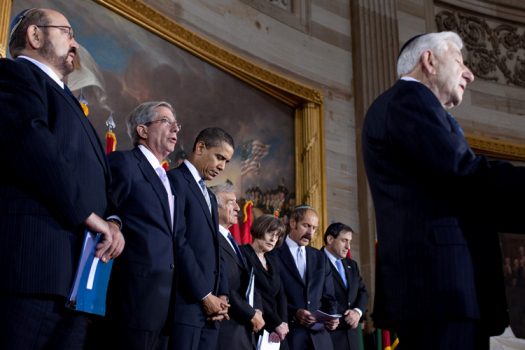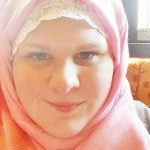
By Jillian Pikora
The world recently lost an amazing man (among many great losses this year), who has influenced the lives of many. I never thought an old Jewish man would be so influential to this Muslim woman’s life, especially since I first learned about him when I was a Catholic girl.
Before I stumbled upon Elie Wiesel’s books on my mother’s shelves, my picture of World War II was a weird amalgamation of Schindler’s List, South Pacific, The Sound of Music and about a dozen other Hollywood movies that skewed my view to be one of war heroes and USO musical numbers.
I knew I had gaps in my knowledge because The Von Trapps and Mr. Schindler were telling me two different stories that resounded with the same theme of Nazis are bad and everyone else is good and innocent — or perhaps that was how my juvenile view formed (looking back, I realized the shades of grey both figuratively and literally are lining each frame in Schindler’s List).
When I began trying to fill those gaps, I felt as though I was reaching for something in utter darkness and was unable to grab on to it, as I searched the children section of my public library to try and discern the truth among the musical numbers in my mind.
Then I discovered a light appearing in that darkness when I first picked up one of his books. He was the same age as I was when I first read his book, Night — a mere 12 years of age when he first encountered the Nazis. Our lives could not be more different, but by reading that book at such a young age my views on both Judaism and WWII were forever tinged with Wiesel’s view of the world.
When my seventh grade teacher assigned The Diary of Anne Frank, it paled in comparison. But my heart sank when I mentioned Night to my teacher — she had never heard of it! My dislike for the teacher and my enjoyment of the way Wiesel conveyed the facts of life in a concentration camp only made me relish breaking the rules and writing my final report on Night instead of the assigned reading.
As mentioned in the books Night and Memoirs, Wiesel was 15 when he first arrived in Auschwitz. When I was 15 the worst thing that had happened to me was that I had moved from New Hampshire to Seattle, shortly after which my most beloved grandmother died. For some reason I reread Night, then Dawn, Day, and Twilight. They gave me perspective on the trivialities of my complaints.
I wasn’t forced to move, and Seattle was heaven compared to what he went through. Yet my teenage mind thought my problems mattered so much that I filled angst-ridden journals with poems and songs about all my woes. Suddenly I stopped this pointless scribble. Because the more I read his work, I couldn’t help but wonder what his journals would have been filled with had he kept journals while in Auschwitz or Buchenwald.
Yes, I was sad about my grandmother passing, but she was in her late seventies, and it was part of life — not like that of a person having their family entirely wiped out by force. This idea literally gave me pause. I put down my notebooks, looked at the world around me and begin to see both the beauty and injustices.
Later on my interest in Wiesel shifted from reading his books to trying to understand exactly who he was as a person. He struggled to become a writer, working first as a reporter. This is something I can relate to, as I too am writing books at night and reporting at work during the day on a below living wage.
I also started my writing career by writing at the United Nations and later writing for magazines in the Middle East. The difference being that I typical wrote for some of the UN websites, for Muslim magazines and about Cairo; while Wiesel reported on the UN, wrote for Jewish magazines and about Jerusalem.
Reporting isn’t enough to earn a the coveted attention of the Nobel Prize Committee, something Wiesel did twice, being considered for both the Nobel Prize for Literature and the Nobel Peace Prize. After more than a decade of silence on the Holocaust, in 1960 he began to write about his experiences. And, although it took years for his books to gain popularity, he continued to tell his stories.
When he was awarded the Nobel Peace Prize in 1986, the committee’s statement gave a vague description of his achievements, merely citing, “with his message and through his practical work in the cause of peace, [Wiesel] is a convincing spokesman for the view of mankind and for the unlimited humanitarianism, which are at all times necessary for a lasting and just peace.”
I find that to simply be a euphemism for using your writing, teaching and activism to give a voice to the millions who have and are suffering.
At the time of his Nobel Peace Prize, it had been more than two decades since his most noted book, Night, had been published. He had gone on to be a professor at Boston University and became a popular speaker on the Holocaust. His subject matter was vast, not only focusing on Jewish people in the USSR, Ethiopia and Israel, but the Desaparecidos in Argentina, native tribes such as the Nicaragua Miskito, the Bosnian genocide, Rwanda genocide, South African apartheid and the plight of the Kurdish people.
It was during one of his many speaking tours my mother first learned his story.
He was his visiting the University of Massachusetts Amherst where my mother was studying, affording her the opportunity to hear him speak. She had never read his books or even heard of him before. As a Catholic engineering student from a small town, why would she have? But her Jewish classmates insisted that she go with them to hear him speak because “this man will change how you see the world.”
They were right. His oratory skills went beyond a good presentation because the clear truths he told were so vivid that the audience felt what he felt — if only for an instant they caught a glimpse of the “kingdom of night” he so often said he resided in. That’s how her shelves became lined with his books.
Wiesel and his wife turned the ideas he discussed into actions. Using his money from his Nobel Peace Prize they started the Elie Wiesel Foundation for Humanity with the goal of combating “indifference, intolerance and injustice through international dialogue and youth-focused programs that promote acceptance, understanding and equality.”
Again, he was reaching out beyond his religious and cultural communities to encourage humanitarian aid in all aspects.
In my lifetime his foundation has continued to help people and encourage activists worldwide. As an individual he went on to write a dozen more books, teach at many institutions, earn seemingly endless awards, become a member of the Knighthood and work with world leaders and celebrities fighting to protect mankind.
He was not without controversy, I discovered his side of him at a turning point in my life. As I entered my twenties, I was trying to deepen my Catholic faith, but ended up in a conversation with my priest on faith that ended with both of us deciding to become Muslims. I did not consider how my friends or the greater world would look at this, because it was between me, God and my now former priest.
I soon found that my knowledge of the history of Israel and Palestine, gained through copious reading and friends I had made with from both countries, were now under a microscope. People around me began to judge my neutral view harshly. Wiesel was a proud Zionist. In his 1986 Nobel Peace Prize speech he stated, “There are the Palestinians to whose plight I am sensitive but whose methods I deplore. Violence and terrorism are not the answer. Something must be done about their suffering, and soon.”
I felt the same way and continued to look into insider’s views on the conflict. Although I’m not a cheerleader for either government and will never feel kinship with Benjamin Netanyahu like Wiesel did; I cannot help but agree with his condemnation of the “use of children as human shields.”

Despite many of my new Muslim friends vowing that Israel was “more wrong” — to me that statement is an oxymoron, because wrong is just wrong. It is as clear to me as thinking that the dancing Nazis were bad in those musicals of my youth.
As I forge ahead I hope my actions, teaching, writing and what I make of my life can create a positive change, no matter how small. For when I turn on the news each morning, the words Wiesel spoke before I was born somehow ring in my ears. “The opposite of love is not hate, but indifference.”
Jillian Pikora is a writer who has contributed to many magazines and news sites including but not limited to; Azizah Magazine, Huffington Post, Coming of Faith, Sisters Magazine, New York Times, The Atlantic, and The Guardian. Jillian has made appearances on CNN, Fox News, CSPAN, and Al Jazeera. She currently is a writer at CairoScene. Learn more about her at: http://jillianpikora.com/














